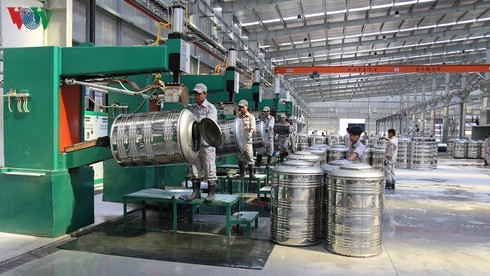Economists have stated that the epidemic is likely to both directly and indirectly affect all sectors of the national economy over the long-term, causing plenty of difficulties when it comes to fulfilling the 2020 targets relating to the socio-economic development plan set by the National Assembly, especially on targets such as economic growth, imports, and exports.
The COVID-19 epidemic has already had a serious impact on the national economy, negatively affecting the country’s exports to the Chinese market, while industries such as mechanics, processing, manufacturing, and textiles have also encountered difficulties when importing input materials that are necessary in production.
    |
 |
|
Photo for illustration. Source: VOV |
Economist Le Dang Doanh said that sectors such as tourism, garment and textile will be the hardest hit by the epidemic, noting that the garment and apparel industry imports up to 60 per cent of its materials from the northern neighbour. As a result, Doanh predicts that economic growth could decline by 1 per cent of GDP.
Furthermore, several enterprises have said that the epidemic will cause a significant impact on their respective production and business plans due to export commodities to the Chinese market being halted, coupled with a sharp decline in revenue.
Tran Thi Thu Hang, General Director of the Vietnam Agricultural Product and Import Export Company, said that the COVID-19 epidemic has caused issues for all of the company’s products when seeking outlets, while retail sales regarding clean agricultural products in the store systems also face hurdles.
Hang added that the company’s agricultural exports to China account for 60 per cent of the company's sales, with the majority of affected products being fresh fruit, poultry eggs, and other types of farm produce.
Amidst the current situation, the government and relevant ministries have taken prompt measures in an attempt to minimise the impact on production activities of relevant industries by shifting focus to the domestic market. In addition, products have been put into the country’s retail distribution system at reasonable prices.
With regard to industrial goods that are able to be stored, local authorities have requested that priority be given to warehouses to store agricultural and aquatic products, along with industrial and consumer goods to ensure that product quality is maintained whilst waiting for customs clearance.
Assoc. Dr. Dinh Trong Thinh, a senior lecturer at the Academy of Finance, emphasised the need to diversify exports and imports over the long term to avoid becoming reliant on a specific country or region whilst maintaining sustainable economic development.
Thinh underlined the importance of a contingency plan by looking to import goods from other countries such as Japan, the Republic of Korea, the European Union, and the United States, whilst taking full advantage of the trade agreements that Vietnam has signed these countries.
Moreover, businesses must improve the overall quality of domestically produced goods to meet requirements in terms of time, quality, categories, and origins of goods to make inroads into more demanding markets.
In addition, with an overall improvement in product quality to meet international standards, domestic businesses will be able to export to developed countries globally. Therefore it would serve to minimise any negative effects of the Chinese economy declining.
Source: VOV